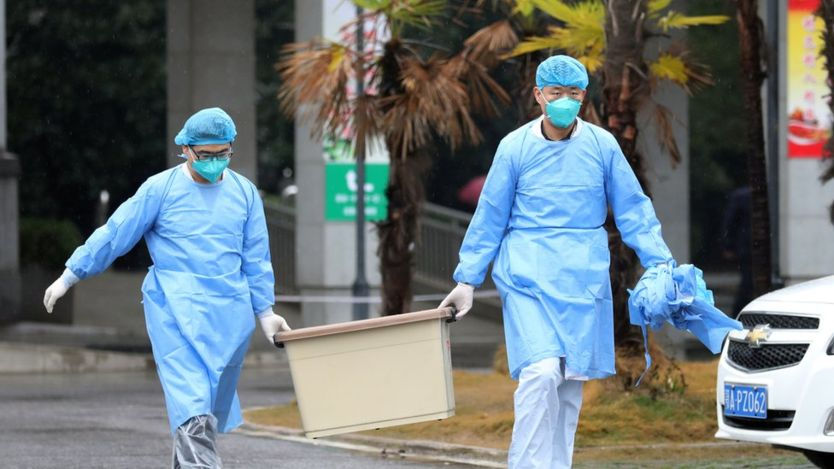Coronavirus: The New China Virus, Chinese authorities warned people to stop travelling to Wuhan
- BENNY OBI

- Jan 22, 2020
- 3 min read
The new China coronavirus increased further on Wednesday in China, where authorities said nine people were dead and advised that the virus could “mutate” and spread more easily.

A previous report communicated the day before reported six deaths.
The virus, which is transmitted through the respiratory tract, “could mutate and spread more easily,” warned Deputy Minister of the National Health Commission Mr Li Bin at a press conference.
He said the virus had been diagnosed in 440 patients, adding to a previous count of around 300 cases.
Many parts of the country are affected, including mega-cities like Shanghai and Beijing.

Authorities fear virus may spread due to long Chinese New Year holidays, which start on Friday, and cause hundreds of millions of bus, train and air travel every year across the country.
Chinese President Xi Jinping has called for "all-out efforts" to control the outbreak,
Mr. Li Bin announced preventive measures such as ventilation and disinfection at airports, stations and shopping malls.
Temperature detectors could also be installed in busy sites, he said.
And the China virus advice: 'Wash your hands, be honest with your doctors', says Hong Kong expert
And same cases have been confirmed elsewhere in Asia and even in the United States, an ad hoc committee of the World Health Organization (WHO) meets on Wednesday consider declaring an international public health emergency over the virus - as it did with swine flu and Ebola. Such a declaration, if made, will be seen as an urgent call for a co-ordinated international response.
The virus was spotted in December in Wuhan, a megalopolis of 11 million inhabitants in the centre of the country, in people working in a wholesale seafood and fish market, whose exact origin is still unknown or the incubation period.
The cases have also been identified abroad: in Thailand, Japan, Asia, South Korea and Taiwan. Those infected had recently returned from Wuhan.
Authorities in many places, including Australia, Singapore, Hong Kong, Taiwan and Japan have stepped up screening of air passengers from Wuhan. US authorities last week announced similar measures at airports in San Francisco, Los Angeles and New York.
On Tuesday, a first-person infected with the coronavirus was hospitalized as a precaution in the United States.
He is a man in his thirties, originally from Wuhan and living near Seattle, in the northwest of the country. He arrived on January 15 without fever at Seattle Airport and contacted local health services himself on Sunday after seeing symptoms.
He has been hospitalized as a precaution and is doing well, but will remain in solitary confinement for at least another 48 hours, according to local authorities.
“We expect other cases in the United States and around the world,” warned Nancy Messonnier, head of the US Centers for Disease Prevention and Control (CDC).
The risk to the Americans, however, remains “low at this point,” she said.
In France, the risk is also “low, but cannot be excluded,” said Health Minister Agnès Buzyn.
Australia, Russia, Nepal, Singapore, Malaysia, Vietnam, Bangladesh and India have tightened controls in recent days.
The offending strain is a new type of coronavirus, a family with a large number of viruses. They can cause mild illnesses in humans (like a cold), but also other more serious ones like SARS.
Zhong Nanshan, a Chinese scientist with the National Health Commission, said on Monday that contagious transmission between people was “proven”. It was the first time that such an assertion was made publicly.
Given the small number of human-to-human contagions reported, the potential for transmission in developed countries “is expected to be low,” said Paul Hunter, professor of health protection at the University of East Anglia, via the organization.
Science Media Center, but on condition that the control procedures are rigorously applied.
Out of 8,096 cases, the SARS virus killed 774 people worldwide, including 349 in mainland China and 299 in Hong Kong, according to the WHO.

The international organization at the time strongly criticized Beijing for having delayed raising the alarm and trying to conceal the extent of the epidemic.
In a separate statement, the Wuhan Municipal Health Commission said at least 15 medical workers in Wuhan have also been infected with the virus, with one in a critical condition.
The workers presumably became infected with the virus due to contact with patients. All of them are being kept in isolated place while being treated.
The World Health Organization has advised people to avoid "unprotected" contact with live animals, thoroughly cook meat and eggs, and avoid close contact with anyone with cold or flu-like symptoms.
Those living in the city of 8.9 million people have also been told to avoid crowds and minimize public gatherings
Signs of infection include respiratory symptoms, fever, cough, shortness of breath and breathing difficulties.





Comments